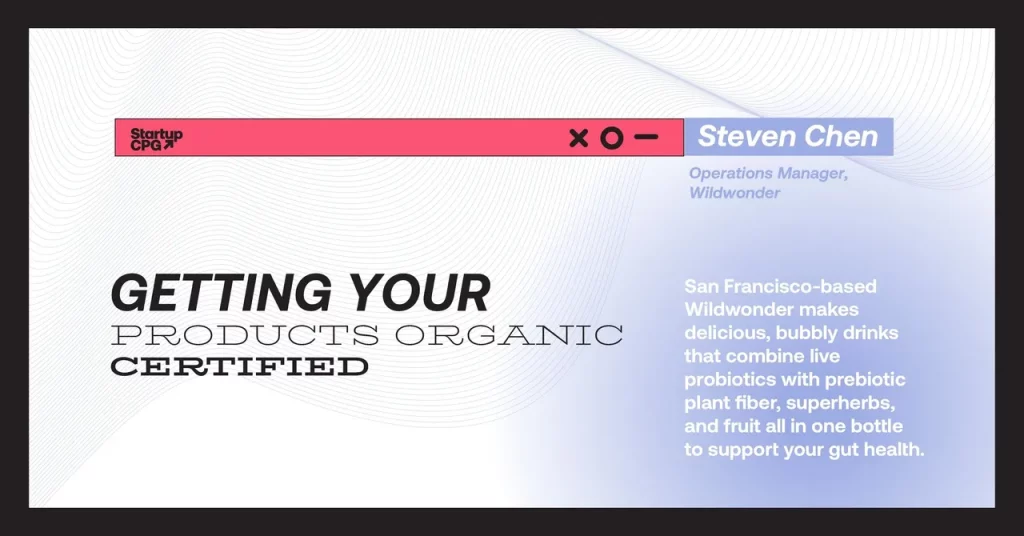Getting Your Products
Organic Certified
Steven Chen is the Operations Manager for San Francisco-based Wildwonder. They make delicious, bubbly drinks that combine live probiotics with prebiotic plant fiber, superherbs, and fruit all in one bottle to support your gut health. Wildwonder is female and BIPOC-founded, and its mission is to create wonders in everyday life and for those under-voiced in our communities. The company’s drinks are all USDA organic certified and vegan.
Getting your products Organic Certified can be a confusing process, but with a little guidance, it can be done! Check out our learnings below that might help you get these important claims approved for your products.
Organic vs. Non-GMO
With all the labels and certifications out there, many consumers are still confused by the difference between USDA organic and Non-GMO. People are always surprised to find out that organic certified products are actually non-GMO and much more. USDA organic certification prohibits the use of GMOs, toxic chemicals, artificial flavors & preservatives, synthetic fertilizers, pesticides, and more. While “organic” has faced its own host of controversies over the years, the USDA organic seal is still a symbol of reliability, especially in packaged food and drinks. Organic-certified products uphold some of the highest standards of quality and sustainability in the industry.
Getting Started
The process for getting your products organic certified differs when you’re self-manufacturing or using a co-packer. The USDA works with a network of ~80 accredited certifying agencies, which are basically organizations that can issue organic certifications, after reviewing a brand’s ingredients and products to ensure they meet USDA organic standards. If self-manufacturing, the facility will need to get certified through a more intensive process that can take anywhere from 6 months to over a year. The USDA breaks down the steps to get your facility certified in this helpful article. The process is a bit easier if you are using a co-packer that already has an organic certification.
Organic Certification
For brands using a co-packer, it’s likely your co-packer already has an organic system plan and an organic certification in place. Ask your co-packer to “sponsor” your certification with their certifying agency, which means your product will be added into their existing set of organic certified products. While this process is much shorter, it can still take anywhere from a few weeks to a few months, depending on the certifying agency.
Managing Your Supply Chain
Once your co-packer agrees to sponsor your organic certification, either the co-packer or the organic certifying agency will ask you to provide a bunch of documents from your raw ingredient suppliers. Basically, the certifying agency needs to confirm that all the ingredients in your product are 100% organic, organic certified, or organic compliant (up to 5% of ingredients can be nonorganic). To speed up this process, ask your suppliers for the following documents upfront and keep them on file and up-to-date:
- Organic Operating Plan (a comprehensive list of all the supplier’s organic ingredients)
- Current Organic Certification
- Specification Sheet, for each ingredient
- Certificate of Analysis (COA), for each ingredient with the most recent lot #
Make sure to keep track of your entire supply chain so you can trace every ingredient from beginning to end. Keep records of all COAs, spec sheets, and lot numbers for all ingredients used for a production. Organic certifying organizations conduct regular audits and will need to confirm that your prior productions and ingredient sources are well documented.
Conclusion
In the growing natural food industry, certifications can add value to your products and build trust among consumers. While getting any type of certification can seem daunting at first, speak with your co-packer, the certifying organization, or reach out to other brands for tips on getting started. USDA organic is a great certification that speaks to quality and sustainability, but it’s up to you to decide whether it’s right for your brand & product (it might not be)! Using all-organic ingredients will raise your costs and certain raw ingredients are hard to source / not widely available as organic. In some cases, conventional ingredients can be processed with equally high standards, if not higher, than organic ingredients, and be more sustainable.
Applying for certifications can also become a lengthy and expensive process for new brands starting out. If you’re trying to get a new product to market as quickly as possible, consider launching the product first and applying for organic certification later. Your product can meet all the standards to become organic-certified without getting certified, which will make your life much easier when applying for the certification down the road!






All Comments